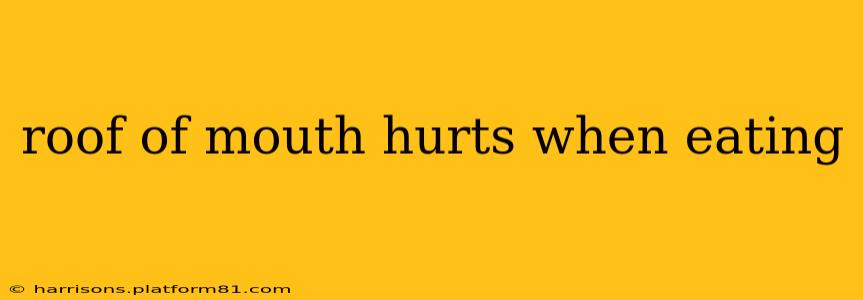Experiencing pain on the roof of your mouth while eating can be incredibly uncomfortable and disruptive. This seemingly simple issue can stem from various underlying causes, ranging from minor irritations to more serious conditions. Understanding the potential reasons behind this pain is the first step towards finding effective relief. This comprehensive guide will explore the common culprits and offer insights into diagnosis and treatment options.
What Could Be Causing Pain on the Roof of My Mouth While Eating?
This is a frequent question among those experiencing this discomfort. The location of the pain—the hard palate (the bony front part of the roof of your mouth) or the soft palate (the fleshy back part)—can offer clues. Several factors can contribute to this problem:
1. Minor Irritations and Injuries:
- Sharp Foods: Hard or jagged food particles can easily scrape or cut the delicate tissues of the palate, leading to immediate pain. This is especially true for those with sensitive palates or existing minor abrasions.
- Hot Foods and Drinks: Burns from excessively hot food or beverages are a common cause of roof-of-the-mouth pain. The severity depends on the temperature and duration of the exposure.
- Acid Reflux (GERD): Stomach acid traveling back up into the esophagus can irritate the tissues of the mouth and throat, including the palate, causing a burning sensation.
- Dry Mouth (Xerostomia): A lack of saliva can lead to dryness and increased sensitivity in the mouth, making it more susceptible to irritation and pain during eating.
2. Oral Health Issues:
- Canker Sores (Aphthous Ulcers): These painful, small ulcers often appear on the inner cheeks, tongue, or palate. Eating can exacerbate the discomfort.
- Mouth Sores (Stomatitis): Inflammation of the mouth's lining can cause pain and discomfort, particularly when eating. This can result from viral infections, allergies, or certain medications.
- Oral Thrush (Candidiasis): A fungal infection that typically appears as white patches on the tongue and palate can cause significant pain and difficulty eating.
- Perforated Palate: In rare cases, a hole or perforation in the hard palate may develop, causing pain and difficulty with chewing.
3. Other Potential Causes:
- Allergies: Certain food allergies can trigger an inflammatory response in the mouth, resulting in pain and swelling on the palate.
- Medications: Some medications have side effects that include mouth sores or dryness, increasing sensitivity and pain when eating.
- Underlying Medical Conditions: In some cases, roof-of-mouth pain can be a symptom of a more serious underlying medical condition, such as autoimmune diseases or vitamin deficiencies.
What Should I Do If the Roof of My Mouth Hurts When I Eat?
The best course of action depends on the underlying cause. For minor irritations, simple home remedies often suffice:
- Gentle Rinsing: Rinse your mouth with warm salt water to help cleanse the area and reduce inflammation.
- Over-the-Counter Pain Relief: Pain relievers like ibuprofen or acetaminophen can help manage discomfort.
- Avoid Irritants: Steer clear of hot, spicy, acidic, or hard foods until the pain subsides.
- Hydration: Staying well-hydrated can help alleviate dryness and promote healing.
However, if the pain is severe, persistent, or accompanied by other symptoms (fever, swelling, difficulty swallowing), it's crucial to seek professional medical advice. A dentist or doctor can properly diagnose the cause and recommend appropriate treatment.
How Can I Prevent Pain on the Roof of My Mouth?
Prevention is key! Here are some practical steps you can take:
- Eat Slowly and Chew Thoroughly: This reduces the risk of biting or scraping the palate.
- Cool Foods Down: Ensure food and beverages are at a safe temperature before consumption.
- Maintain Good Oral Hygiene: Regular brushing and flossing help prevent infections and maintain a healthy oral environment.
- Stay Hydrated: Adequate hydration supports saliva production, keeping the mouth moist and less susceptible to irritation.
- Manage Acid Reflux: If you suffer from GERD, consult a doctor for treatment options to prevent acid from reaching the mouth.
Remember, persistent pain on the roof of your mouth warrants a visit to a healthcare professional. Early diagnosis and treatment are crucial for managing the underlying cause and ensuring optimal oral health.
